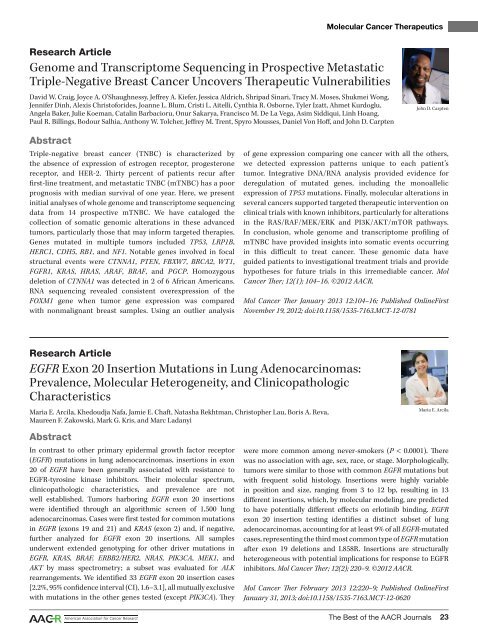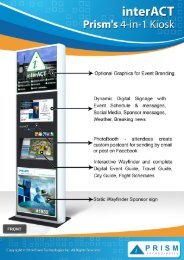Best of AACR Journals
Create successful ePaper yourself
Turn your PDF publications into a flip-book with our unique Google optimized e-Paper software.
Molecular Cancer Therapeutics<br />
Research Article<br />
Genome and Transcriptome Sequencing in Prospective Metastatic<br />
Triple-Negative Breast Cancer Uncovers Therapeutic Vulnerabilities<br />
David W. Craig, Joyce A. O’Shaughnessy, Jeffrey A. Kiefer, Jessica Aldrich, Shripad Sinari, Tracy M. Moses, Shukmei Wong,<br />
Jennifer Dinh, Alexis Christ<strong>of</strong>orides, Joanne L. Blum, Cristi L. Aitelli, Cynthia R. Osborne, Tyler Izatt, Ahmet Kurdoglu,<br />
Angela Baker, Julie Koeman, Catalin Barbacioru, Onur Sakarya, Francisco M. De La Vega, Asim Siddiqui, Linh Hoang,<br />
Paul R. Billings, Bodour Salhia, Anthony W. Tolcher, Jeffrey M. Trent, Spyro Mousses, Daniel Von H<strong>of</strong>f, and John D. Carpten<br />
John D. Carpten<br />
Abstract<br />
Triple-negative breast cancer (TNBC) is characterized by<br />
the absence <strong>of</strong> expression <strong>of</strong> estrogen receptor, progesterone<br />
receptor, and HER-2. Thirty percent <strong>of</strong> patients recur after<br />
first-line treatment, and metastatic TNBC (mTNBC) has a poor<br />
prognosis with median survival <strong>of</strong> one year. Here, we present<br />
initial analyses <strong>of</strong> whole genome and transcriptome sequencing<br />
data from 14 prospective mTNBC. We have cataloged the<br />
collection <strong>of</strong> somatic genomic alterations in these advanced<br />
tumors, particularly those that may inform targeted therapies.<br />
Genes mutated in multiple tumors included TP53, LRP1B,<br />
HERC1, CDH5, RB1, and NF1. Notable genes involved in focal<br />
structural events were CTNNA1, PTEN, FBXW7, BRCA2, WT1,<br />
FGFR1, KRAS, HRAS, ARAF, BRAF, and PGCP. Homozygous<br />
deletion <strong>of</strong> CTNNA1 was detected in 2 <strong>of</strong> 6 African Americans.<br />
RNA sequencing revealed consistent overexpression <strong>of</strong> the<br />
FOXM1 gene when tumor gene expression was compared<br />
with nonmalignant breast samples. Using an outlier analysis<br />
<strong>of</strong> gene expression comparing one cancer with all the others,<br />
we detected expression patterns unique to each patient’s<br />
tumor. Integrative DNA/RNA analysis provided evidence for<br />
deregulation <strong>of</strong> mutated genes, including the monoallelic<br />
expression <strong>of</strong> TP53 mutations. Finally, molecular alterations in<br />
several cancers supported targeted therapeutic intervention on<br />
clinical trials with known inhibitors, particularly for alterations<br />
in the RAS/RAF/MEK/ERK and PI3K/AKT/mTOR pathways.<br />
In conclusion, whole genome and transcriptome pr<strong>of</strong>iling <strong>of</strong><br />
mTNBC have provided insights into somatic events occurring<br />
in this difficult to treat cancer. These genomic data have<br />
guided patients to investigational treatment trials and provide<br />
hypotheses for future trials in this irremediable cancer. Mol<br />
Cancer Ther; 12(1); 104–16. ©2012 <strong>AACR</strong>.<br />
Mol Cancer Ther January 2013 12:104–16; Published OnlineFirst<br />
November 19, 2012; doi:10.1158/1535-7163.MCT-12-0781<br />
Research Article<br />
EGFR Exon 20 Insertion Mutations in Lung Adenocarcinomas:<br />
Prevalence, Molecular Heterogeneity, and Clinicopathologic<br />
Characteristics<br />
Maria E. Arcila, Khedoudja Nafa, Jamie E. Chaft, Natasha Rekhtman, Christopher Lau, Boris A. Reva,<br />
Maureen F. Zakowski, Mark G. Kris, and Marc Ladanyi<br />
Maria E. Arcila<br />
Abstract<br />
In contrast to other primary epidermal growth factor receptor<br />
(EGFR) mutations in lung adenocarcinomas, insertions in exon<br />
20 <strong>of</strong> EGFR have been generally associated with resistance to<br />
EGFR-tyrosine kinase inhibitors. Their molecular spectrum,<br />
clinicopathologic characteristics, and prevalence are not<br />
well established. Tumors harboring EGFR exon 20 insertions<br />
were identified through an algorithmic screen <strong>of</strong> 1,500 lung<br />
adenocarcinomas. Cases were first tested for common mutations<br />
in EGFR (exons 19 and 21) and KRAS (exon 2) and, if negative,<br />
further analyzed for EGFR exon 20 insertions. All samples<br />
underwent extended genotyping for other driver mutations in<br />
EGFR, KRAS, BRAF, ERBB2/HER2, NRAS, PIK3CA, MEK1, and<br />
AKT by mass spectrometry; a subset was evaluated for ALK<br />
rearrangements. We identified 33 EGFR exon 20 insertion cases<br />
[2.2%, 95% confidence interval (CI), 1.6–3.1], all mutually exclusive<br />
with mutations in the other genes tested (except PIK3CA). They<br />
were more common among never-smokers (P < 0.0001). There<br />
was no association with age, sex, race, or stage. Morphologically,<br />
tumors were similar to those with common EGFR mutations but<br />
with frequent solid histology. Insertions were highly variable<br />
in position and size, ranging from 3 to 12 bp, resulting in 13<br />
different insertions, which, by molecular modeling, are predicted<br />
to have potentially different effects on erlotinib binding. EGFR<br />
exon 20 insertion testing identifies a distinct subset <strong>of</strong> lung<br />
adenocarcinomas, accounting for at least 9% <strong>of</strong> all EGFR-mutated<br />
cases, representing the third most common type <strong>of</strong> EGFR mutation<br />
after exon 19 deletions and L858R. Insertions are structurally<br />
heterogeneous with potential implications for response to EGFR<br />
inhibitors. Mol Cancer Ther; 12(2); 220–9. ©2012 <strong>AACR</strong>.<br />
Mol Cancer Ther February 2013 12:220–9; Published OnlineFirst<br />
January 31, 2013; doi:10.1158/1535-7163.MCT-12-0620<br />
The <strong>Best</strong> <strong>of</strong> the <strong>AACR</strong> <strong>Journals</strong> 23



